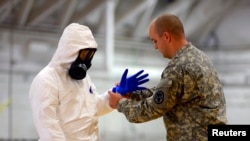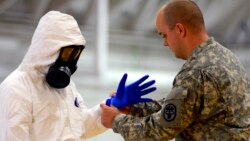We are beginning to see signs that the massive international effort to combat Ebola in West Africa is working.
Since September, when President Obama announced a major increase in the U.S. effort and personally encouraged fellow world leaders to do so too, diplomats and doctors, soldiers and supply experts, health workers and humanitarian specialists have worked side-by-side to turn the tide. Now, according to the World Health Organization, the Ebola case incidence has declined to much lower levels in Liberia, and is showing signs of leveling off in Sierra Leone.
But much more must be done. This effort will not be complete until there are no more active Ebola cases in Africa. While President Obama’s foremost priority is American public health, this necessarily means ending the Ebola outbreak at its source in Africa. This is why the U.S. Congress recently approved $5.4 billion in emergency funding to fight the Ebola outbreak.
The funding will support the work of infection control specialists from the U.S. Centers for Disease Control and Prevention, disaster relief workers from the U.S. Agency for International Development, and health security specialists from the Department of Defense and the State Department who are working in concert to combat this outbreak. The money supports a wide range of urgent needs, including the acquisition of personal protective equipment; medical and non-medical management of Ebola treatment units; infection control; contact tracing; laboratory capacity; disease surveillance; burial teams; biosecurity and biosafety activities; and the testing and development of new vaccines, therapeutics and diagnostics.
The U.S. has also focused on identifying innovative approaches to bring the full range of resources to bear against the crisis. We have identified and obtained funding, for example, for a project by the International Atomic Energy Agency that will improve and streamline efforts to diagnose the Ebola virus, in a demonstration of one of the many peaceful uses of nuclear technology.
The project will provide high-quality training and equipment based on nuclear science to teams of virologists in 11 African countries. They include Cote d’Ivoire, Guinea, Liberia, Mali, Mauritania, Niger, Nigeria, Senegal, Sierra Leone, South Africa and Uganda. This will help these specialists more quickly and safely diagnose Ebola and other emerging diseases, too.
The project is one component of a scaled-up international response that is working to end the epidemic, and promote long-term health security that will keep us all safe.






